This podcast series delves into essential aspects of podcasting, including navigating copyright concerns, ensuring content accuracy, and enhancing audience retention. Creators will learn how to use legally permissible content, maintain credibility through thorough fact-checking, and implement strategies to keep listeners engaged. Join us as we explore best practices that can elevate your podcasting experience.
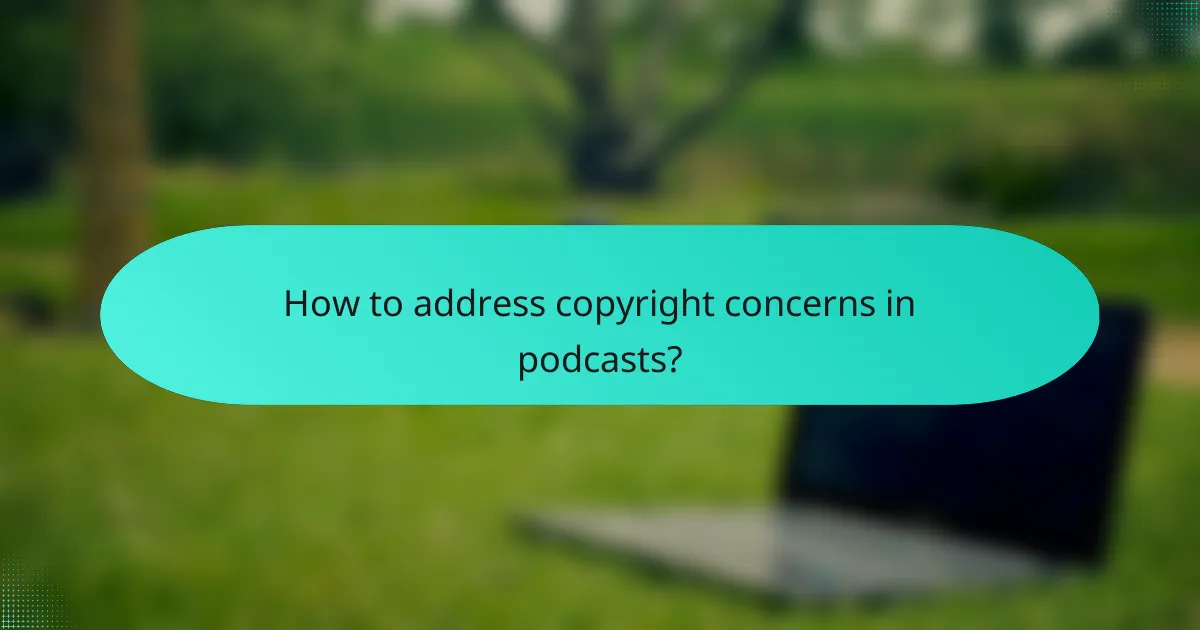
How to address copyright concerns in podcasts?
To address copyright concerns in podcasts, creators should focus on using legally permissible content and understanding the rights associated with various materials. This involves selecting royalty-free music, obtaining necessary licenses, and applying fair use principles effectively.
Use royalty-free music
Royalty-free music is a cost-effective way to enhance your podcast without infringing on copyright. Many platforms offer tracks that can be used for a one-time fee or even for free, provided you follow their usage guidelines.
When selecting royalty-free music, check the licensing terms carefully. Some may require attribution or have restrictions on commercial use. Popular sources include sites like AudioJungle, Epidemic Sound, and Free Music Archive.
Obtain licenses for copyrighted material
If you want to use copyrighted music, sound effects, or other content, obtaining the appropriate licenses is essential. This often involves contacting the copyright holder or using licensing services that facilitate the process.
Licensing fees can vary widely based on the type of content and its intended use. For example, using a popular song in a commercial podcast may cost hundreds to thousands of dollars, while lesser-known works may be more affordable. Always ensure you have the correct permissions before broadcasting.
Implement fair use guidelines
Fair use allows limited use of copyrighted material without permission under specific circumstances, such as commentary, criticism, or educational purposes. However, determining fair use can be complex and subjective.
To strengthen your fair use claim, consider the purpose of your use, the nature of the original work, the amount used, and the effect on the market value. For instance, using a short clip for commentary in a review podcast is more likely to be considered fair use than using a full song. Always err on the side of caution and consult legal advice if unsure.
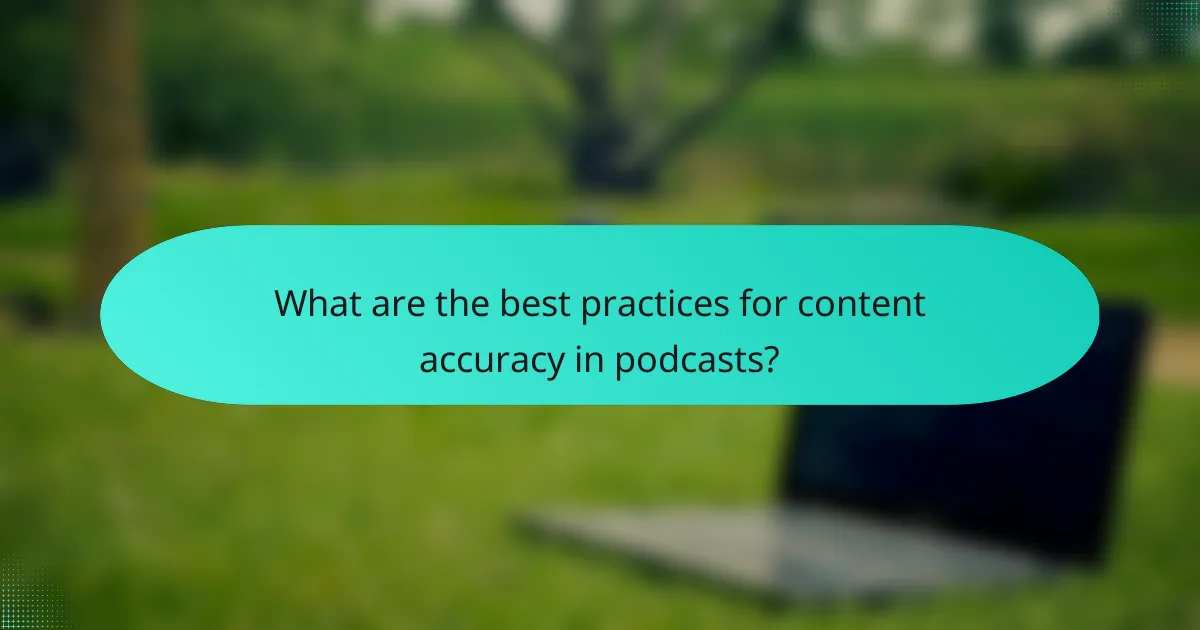
What are the best practices for content accuracy in podcasts?
Ensuring content accuracy in podcasts is crucial for maintaining credibility and audience trust. Best practices include thorough fact-checking, citing reliable sources, and involving experts to validate the information presented.
Fact-check all information
Fact-checking is essential to verify the accuracy of the information shared in your podcast. This process involves cross-referencing claims with reputable sources and ensuring that all data is current and relevant. Consider using fact-checking websites or databases to confirm statistics and statements.
Common pitfalls include relying on outdated information or unverified anecdotes. To avoid this, set aside dedicated time for fact-checking before recording each episode, and keep a checklist of key points that require verification.
Cite credible sources
Citing credible sources enhances the reliability of your podcast content. Whenever you present data or quotes, mention the source clearly, whether it’s a research study, a news article, or an expert opinion. This not only builds trust but also allows listeners to explore the information further.
Use a consistent citation format throughout your episodes. For example, you might say, “According to a 2022 study published in the Journal of Communication…” This practice helps listeners understand the context and credibility of the information provided.
Invite expert guests for validation
Inviting expert guests to your podcast can significantly enhance content accuracy. Experts can provide insights that are not only accurate but also nuanced, helping to clarify complex topics for your audience. Consider reaching out to professionals in the field relevant to your podcast theme.
When selecting guests, ensure they have a strong background and are recognized in their area of expertise. This adds authority to your discussions and reassures listeners that they are receiving well-informed perspectives. Prepare questions in advance to guide the conversation and extract valuable insights from your guests.
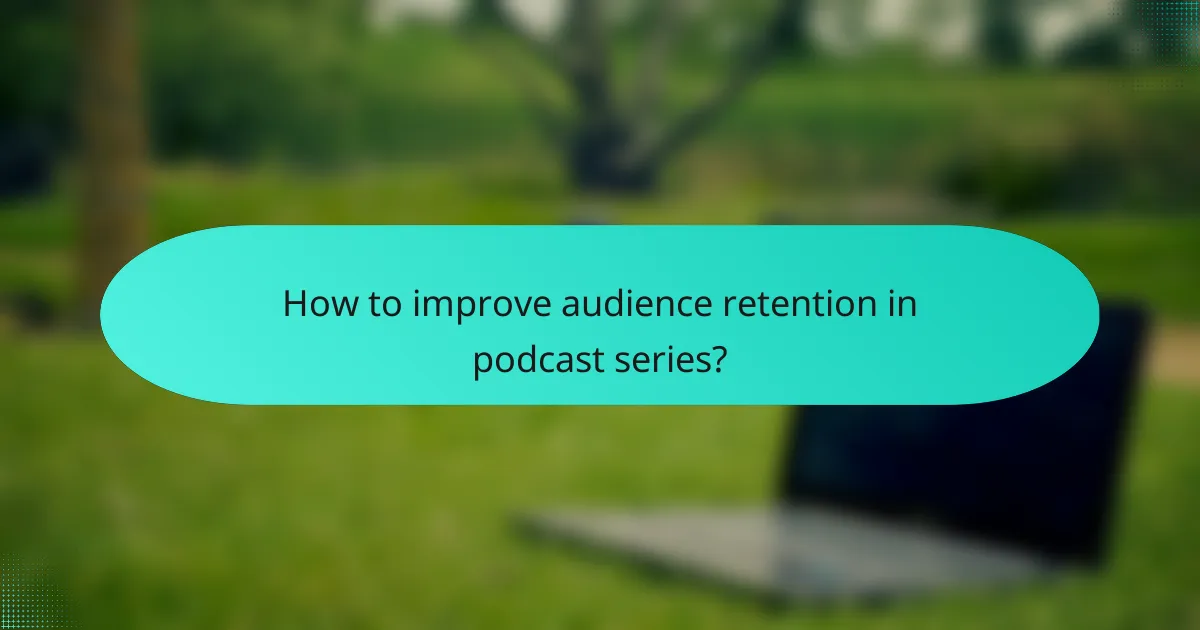
How to improve audience retention in podcast series?
To enhance audience retention in podcast series, focus on delivering high-quality, engaging content that resonates with listeners. Consistently applying effective techniques can keep your audience coming back for more.
Create engaging content
Engaging content is vital for retaining listeners. Start by identifying topics that align with your audience’s interests and preferences. Use a mix of formats, such as interviews, discussions, and expert insights, to maintain variety.
Consider incorporating elements like humor, relatable anecdotes, or current events to make your content more appealing. Regularly updating your content strategy based on listener trends can also help keep your episodes fresh and relevant.
Utilize storytelling techniques
Storytelling can significantly enhance audience retention by creating an emotional connection. Structure your episodes with a clear beginning, middle, and end to guide listeners through the narrative. This approach helps maintain interest and encourages listeners to stay engaged.
Incorporate personal stories or case studies that illustrate your points. This not only makes your content more relatable but also allows listeners to see the real-world implications of the topics discussed.
Incorporate listener feedback
Actively seeking and incorporating listener feedback can improve retention by making your audience feel valued. Use surveys, social media, or direct messages to gather insights on what your listeners enjoy and what they want to hear more of.
Responding to feedback and making adjustments based on listener preferences can foster a sense of community. This involvement encourages listeners to return, knowing their opinions shape the content they consume.
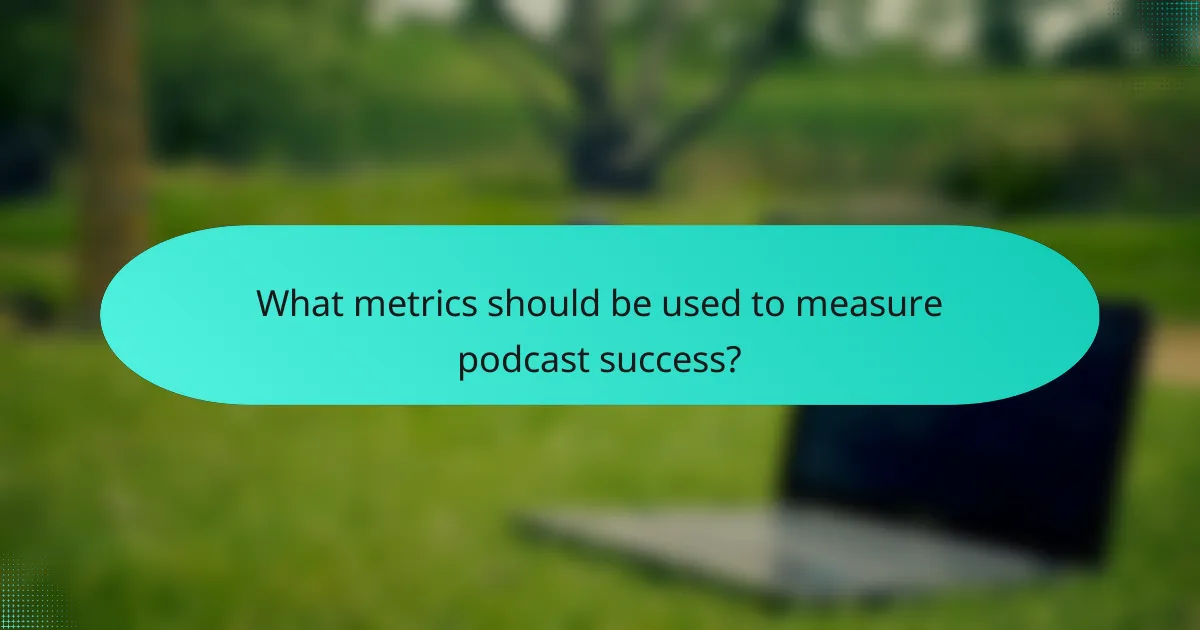
What metrics should be used to measure podcast success?
To measure podcast success, focus on key metrics such as listener growth, episode completion rates, and audience engagement. These metrics provide insights into how well your content resonates with your audience and can guide improvements.
Track listener growth
Tracking listener growth involves monitoring the increase in your audience over time. This can be measured through downloads, subscriptions, and unique listeners. A steady growth rate, typically in the range of 10-20% month-over-month, indicates that your podcast is gaining traction.
Utilize analytics tools provided by podcast hosting platforms to visualize growth trends. This data helps identify successful marketing strategies or content types that attract new listeners.
Analyze episode completion rates
Episode completion rates measure how many listeners finish your episodes. A high completion rate, generally above 70%, suggests that your content is engaging and holds the audience’s attention. Conversely, low rates may indicate that episodes are too long or not compelling enough.
To improve completion rates, consider breaking longer episodes into shorter segments or enhancing storytelling elements. Regularly review completion statistics to adjust your content strategy accordingly.
Monitor audience engagement
Audience engagement can be assessed through metrics such as social media interactions, listener feedback, and reviews. High engagement levels often correlate with a loyal listener base, which is crucial for long-term success. Aim for consistent interaction across platforms to foster community.
Encourage listener participation by asking for feedback or questions during episodes. This not only boosts engagement but also provides valuable insights into what your audience enjoys or wants to hear more about.
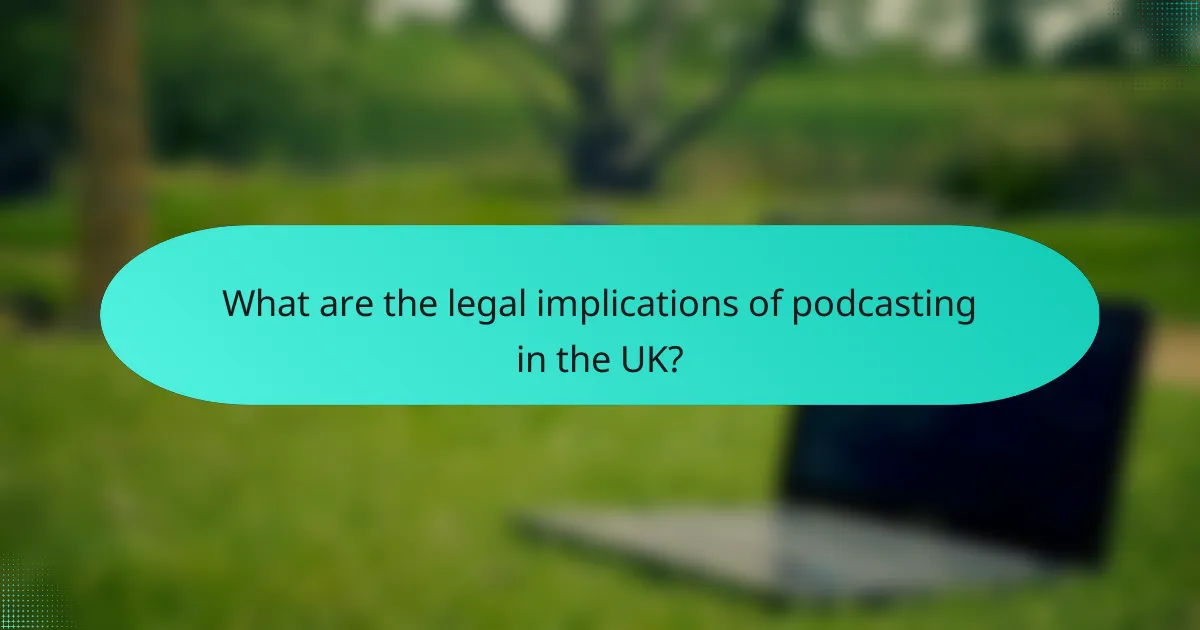
What are the legal implications of podcasting in the UK?
Podcasting in the UK involves several legal considerations, primarily around copyright, broadcasting regulations, and data protection. Creators must navigate these laws to avoid potential legal issues and ensure compliance.
Understand broadcasting regulations
In the UK, podcasters must be aware of broadcasting regulations set by Ofcom, particularly if their content could be classified as broadcasting. This includes understanding the distinctions between podcasts and traditional broadcasts, as well as any licensing requirements that may apply.
For example, if your podcast includes music or other copyrighted material, you may need to secure licenses from rights holders. Failing to do so can lead to legal action and financial penalties.
Comply with GDPR for audience data
Podcasters in the UK must comply with the General Data Protection Regulation (GDPR) when handling audience data. This includes obtaining consent from listeners before collecting personal information and ensuring that data is stored securely.
To comply with GDPR, clearly inform your audience about what data you collect, how it will be used, and their rights regarding their personal information. Regularly review your data practices to avoid common pitfalls, such as retaining data longer than necessary or failing to provide opt-out options.
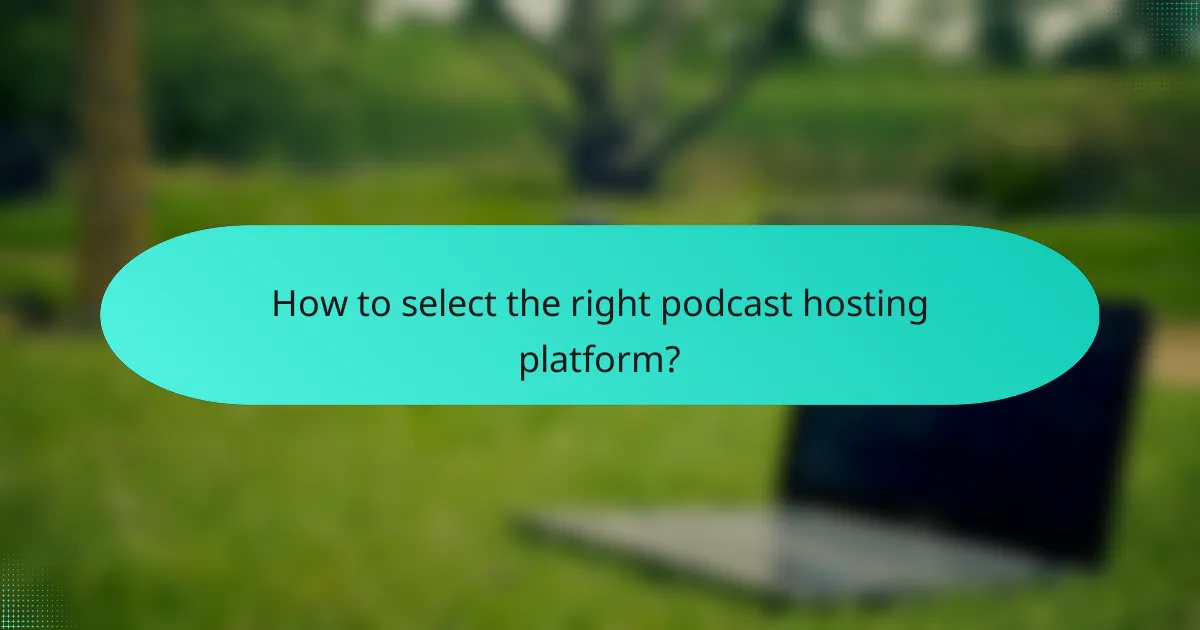
How to select the right podcast hosting platform?
Selecting the right podcast hosting platform involves evaluating several key factors, including storage capacity, bandwidth, and analytics features. A good platform should meet your podcasting needs while providing reliable performance and insights into your audience engagement.
Evaluate storage and bandwidth options
When choosing a podcast hosting platform, consider the storage and bandwidth it offers. Most platforms provide a range of storage options, typically from a few gigabytes to unlimited space, depending on your needs. Ensure that the bandwidth can handle your expected audience size, especially if you anticipate rapid growth.
For example, if you plan to release multiple episodes weekly, opt for a plan that allows for higher storage limits and sufficient bandwidth to accommodate downloads without throttling. Look for platforms that offer scalable options, so you can upgrade as your podcast grows.
Consider analytics features
Analytics features are crucial for understanding your audience’s behavior and engagement. A robust hosting platform should provide insights such as download statistics, listener demographics, and episode performance metrics. This data can help you tailor your content and marketing strategies effectively.
Some platforms offer advanced analytics, including real-time data and trends over time, which can be invaluable for making informed decisions about your podcast. Look for features like heat maps that show when listeners drop off during episodes, allowing you to adjust your content accordingly.
Compare pricing plans
Pricing plans for podcast hosting can vary significantly, so it’s essential to compare them based on your budget and needs. Many platforms offer tiered pricing, with basic plans starting at a low monthly fee and premium plans that include additional features such as advanced analytics or marketing tools.
Consider what each plan includes and whether it aligns with your podcasting goals. Some platforms may charge extra for additional storage or bandwidth, while others might offer all-inclusive packages. Always read the fine print to avoid unexpected costs as your podcast grows.
